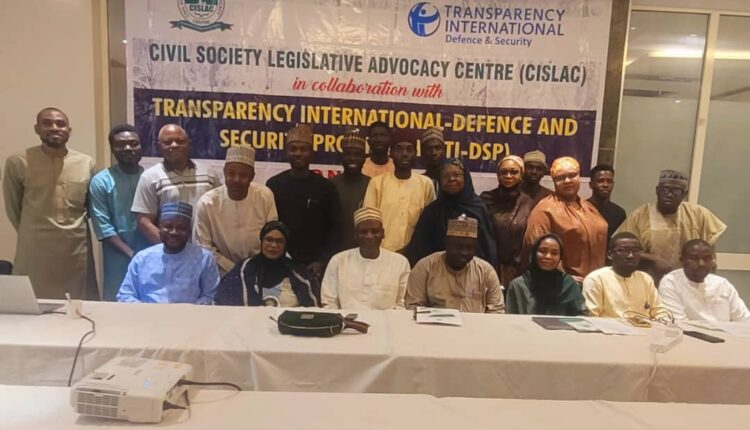The Civil Society Legislative Advocacy Centre (CISLAC), has trained various Civil Society Organisations in Kano state on the defense and security sector, focusing on financial management, gender, and operational disparities.
The two-day defence and security sector anti-corruption training was organised in collaboration with Transparency International Defence and Security Project, with support from the Ministry of Foreign Affairs of the Netherlands.
Speaking at event on Thursday, executive director of CISLAC, Auwal Ibrahim Musa, represented by communications specialist CISLAC, Abukakar Jimoh, said the aim of the training was to strengthen the capacity of civil society and relevant stakeholders to conduct state and national engagements towards an accountable, responsive, and efficient management of the Nigerian defense and security sector.
“In Nigeria, since 1999, several reforms have been carried out in the defense and security sector. However, we observed at our institution that those reforms had little or no impact. Therefore, we decided to select three key components of reform that affect the defense and security performance in Nigeria. Those areas are operational disparity, gender inclusion, and financial management. Nigeria has gone through many phases in terms of defense and security corruption. One of them is diversion of funds, inflation of budgets, and mismanagement of funds, which endanger the security process in Nigeria.
READ MORE: $150M Abacha Loot: CISLAC, TI, urge Nigerian, France Govt to uphold assets recovery laws

“We build a societal synergy. We enhance our capacity towards what we call external oversight. By external oversight, I mean an independent oversight of the federal security sector from outside, not within. You, as civil society, you, as media, have the fundamental mandate to ensure that you oversee the defense and security sector. And how do you do that? You need to have the capacity to do that. I am not talking about your capacity. I am talking about the technical capacity to engage the defense and security sector in terms of some key components we mentioned.
“We notice that if we build civil society capacity, we build media capacity towards defense and security external oversight, we will have good outcome.”
The resource person, Dr. Sunday Adejoh, during his presentation said civil society has a lot of roles to play in addressing the security challenges that Nigeria is facing and also improving transparency and accountability in the country.
“Civil society must see themselves as partners in progress. They must not create an impression of being opposed to the defence and security sector. There is a need for collaboration between them and the defence sector to ensure that the funds that are budgeted are adequately utilized by those responsible for implementing our defence policy and also ensuring that our country is safe and free from all forms of threats.”
“Oversight is very important for security sector accountability and responsibility, there is need to promote security sector reforms especially in relations to information disclosure, and also there should be increased capacity building for security sector oversight bodies and agencies.”
He added that despite extant laws that requires sharing of public information such as the freedom of information act, 2011, the sector in Nigeria remains one of the most opaque and secretive sectors in the country.
“There is a need to clearly clarify and list issues, subjects and categories of information that are classified, restricted without disclosure.”
Also speaking at the event, Professor Bello Ibrahim, from the Department of Sociology, Bayero University Kano, recommended that for Nigeria to address the issues of corruption and the challenges that the defence and security sector are facing, the Nigerian government should simplify the procedures for prosecuting corrupt officials and establish hotlines for public reports and encourage their protection.
He added that the Nigerian government should decentralize the anti-corruption responsibility, encourage the passage of freedom of information legislation, and encourage spot checks and surveillance.
“Government should computerize their civil service, encourage electronic payment systems, and raise incentives to increase revenue.
“The Nigerian government should make it easier for tax evaders to pay, lower the rates charged, raise the penalties, review the cases, and enforce them.”



Comments are closed.